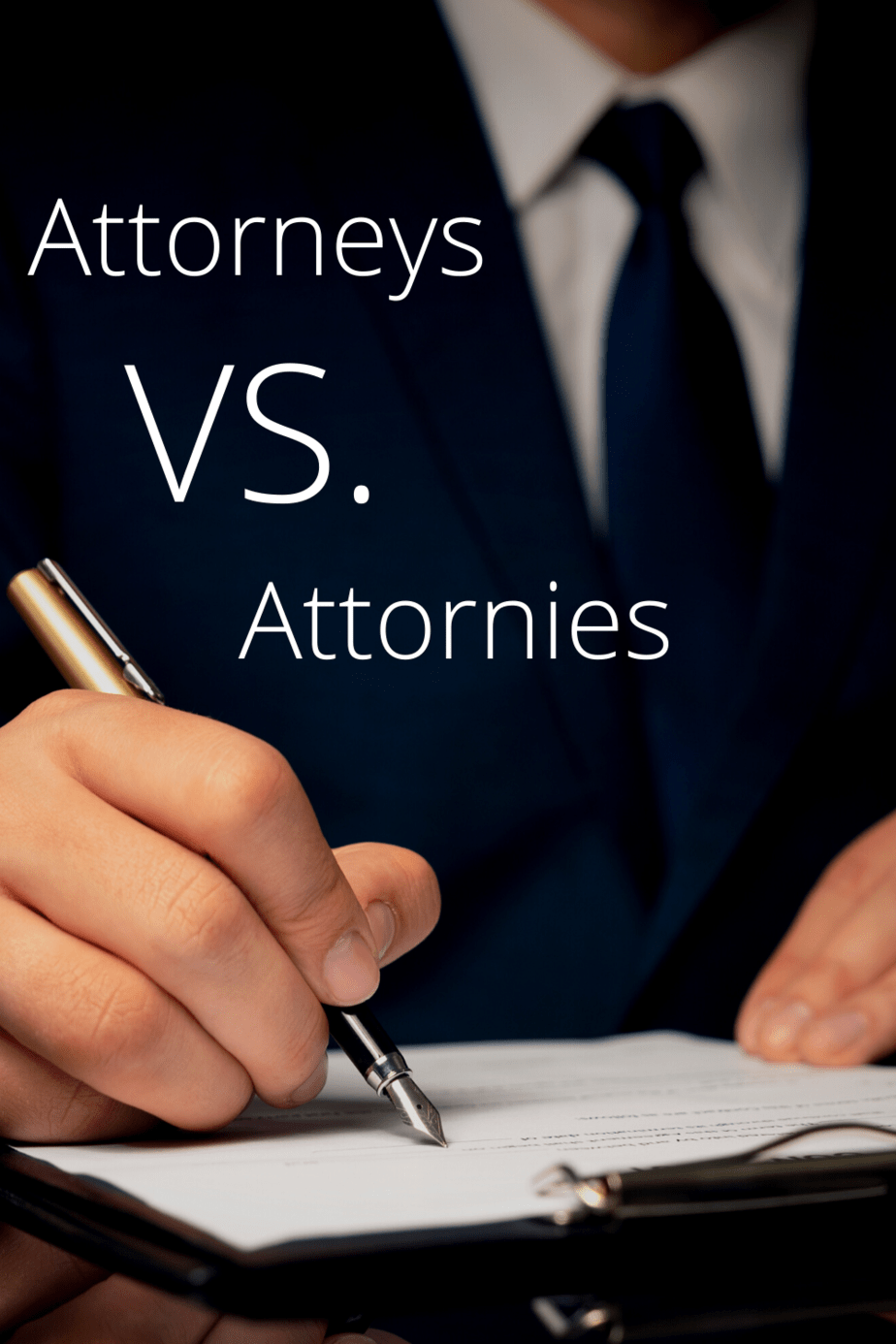When it comes to plural words, some languages have it easy.
In Japanese, for instance, you simply use the exact same word with no spelling change required.
English sometimes has plurals that are the same as the singular form (deer and deer, for instance), but more often than not it’s a perplexing task to figure out how to spell the plural of a particular word.
That’s because some words have irregular plural spellings. One of those words is “attorney.”
What is the plural of attorney?
How to pluralize a word ending in -y
Attorneys: more than one attorney
What about an attorney general?
What is the plural of attorney?
The plural of attorney is “attorneys.” Because of the vowel before the final letter, this word doesn’t follow the rule of “-y” words turning to “-ies” when pluralized. If you’re talking about an “attorney general,” the plural form is “attorneys general” in the US and “attorney-generals” in the UK.
How to pluralize a word ending in -y
Typically, the rule for words that end in -y is to remove the y from the word and add -ies.
Thus, “fry” becomes “fries,” “try” becomes “tries,” and “party” becomes “parties.”
However, when the -y is preceded by a vowel (e, a, i, o or u), the rule is different. Instead of dropping the y, you just add an “s” like you would with most other words.
This avoids confusing and unpronounceable words like “traies” instead of “trays,” for instance.
Put simply, the “rule” for -y words is actually an exception to the normal pluralization rules in English: just add an s on the end.
Examples
This sounds like a tongue-twister, but it does contain three correctly pluralized -y words.
If reading this makes your head spin, just imagine how the waiter or waitress responsible for all these orders must feel.
Again, because “fry” and “party” end in a y, they are pluralized by dropping the y and adding ies.
The words “attorney” and “tray,” however, don’t follow this rule because the “y” is preceded by a vowel.

Attorneys: more than one attorney
As explained in our example above, the plural form of “attorney” follows the standard English pattern.
That is, you simply add an “s” to the end of the word, ending up with “attorneys.”
The reason this word isn’t “attornies” is because of the “e” before the “y.”
That means that if we were to follow the “drop the y” rule, the word would end up looking like this: “attorneies.”
Can you pronounce that? We sure can’t!
If you need a device to help you remember this, try imagining all those attorneys saying “yes.” You can’t say “yes” without a y, so they have to be attorneys rather than attornies.
Examples
Both these examples have the word “attorneys” correctly spelled.
If you’re interested in the answer to the second question, the immensely popular law blog Above the Law has a few good ones.
My favorite answer, though, is “How many can you afford?”
What about an attorney general?
We’ve established beyond a doubt that the plural of “attorney” is “attorneys.”
What about if you’re dealing with more than one attorney general, though?
An attorney general, in the United States, is the top legal official in a particular state.
Basically, their job is to help local and federal law enforcement agencies and judges uphold the law in their home state.
So, what do you do when there’s a gathering of them?
Pluralizing compound nouns
The word “attorney general” is a compound noun.
More specifically, it’s a compound noun that’s made of up of a noun and an adjective.
The word “general” isn’t like the rank in the military, in other words, but an adjective describing the attorney’s duties as “general,” or non-specialized ones.
When pluralizing this kind of noun, it’s the first word (which is the actual noun) that takes the plural, not the second.
To make that clear, the word “flowerpot” becomes “flowerpots” because there is in fact more than one pot. The number of flowers is irrelevant, which is why it’s not “flowerspot.”
With compound nouns where the adjective comes second, this fact is reversed.
If you ask, “How many gallons imperial does the recipe call for?” you’ll immediately be understood.
If you say “How many gallon imperials?,” people will want to know what exactly an imperial is, and why it matters that you get one that occupies a gallon, rather than another unit of measurement.
That said, sometimes there are exceptions to this.
If a word is so commonly used as a compound that it’s essentially become a single noun, you should hyphenate the two words and pluralize the whole compound noun. (This is called a “closed compound.”)
This explains why you can say “three spoonfuls” and people won’t ask how, exactly, you pluralize a “full.” (Even so, “spoonsful” is technically the correct spelling!)
The plural of “attorney general
The answer to this question differs depending on if you’re in the US or the UK.
In the US, the word is still habitually separated rather than joined by a hyphen. That means we need to follow the rule described above and say “attorneys general.”
In the UK, however, the word is a closed compound, so it’s always hyphenated.
That means it should be treated as a regular noun, and the plural in the UK becomes “attorney-generals.”
Examples
Notice that “attorneys” takes on its usual plural form here and is then followed by the adjective “general” as is typical.
If we were in the UK, we would instead be asking how many chips the parties of attorney-generals ordered.
Perhaps the best answer to either question is, like with the joke about light bulbs, “how many can you afford?”

Hey fellow Linguaholics! It’s me, Marcel. I am the proud owner of linguaholic.com. Languages have always been my passion and I have studied Linguistics, Computational Linguistics and Sinology at the University of Zurich. It is my utmost pleasure to share with all of you guys what I know about languages and linguistics in general.

